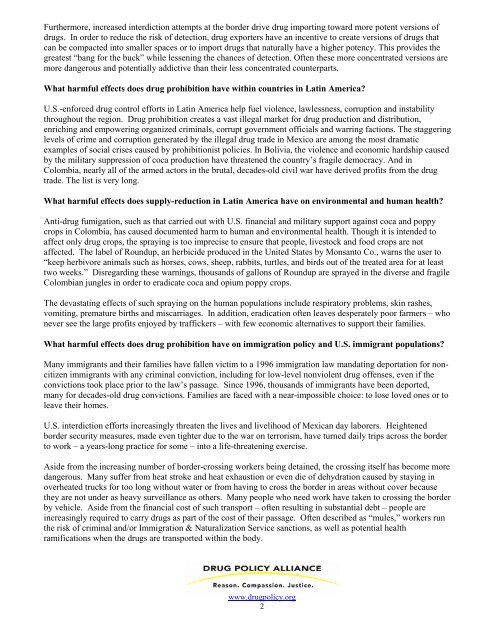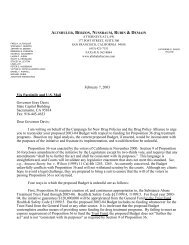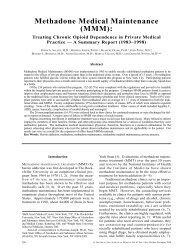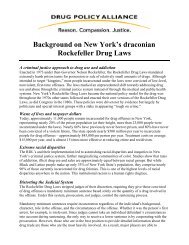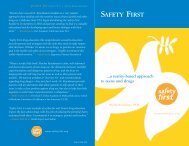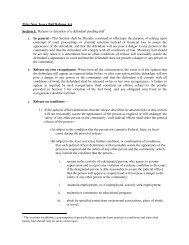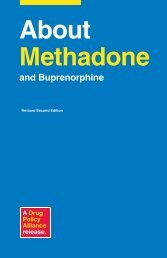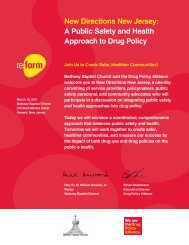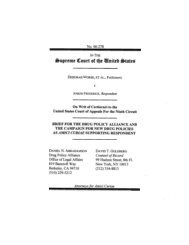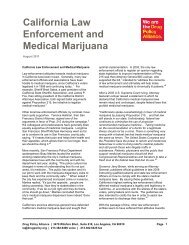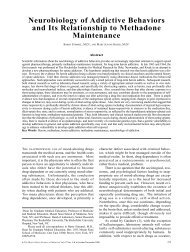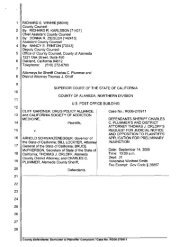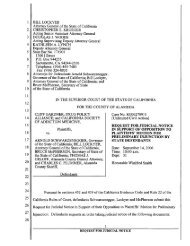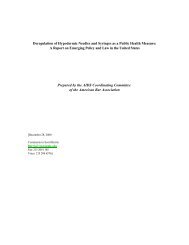The Drug War Across Borders - Drug Policy Alliance
The Drug War Across Borders - Drug Policy Alliance
The Drug War Across Borders - Drug Policy Alliance
You also want an ePaper? Increase the reach of your titles
YUMPU automatically turns print PDFs into web optimized ePapers that Google loves.
Furthermore, increased interdiction attempts at the border drive drug importing toward more potent versions of<br />
drugs. In order to reduce the risk of detection, drug exporters have an incentive to create versions of drugs that<br />
can be compacted into smaller spaces or to import drugs that naturally have a higher potency. This provides the<br />
greatest “bang for the buck” while lessening the chances of detection. Often these more concentrated versions are<br />
more dangerous and potentially addictive than their less concentrated counterparts.<br />
What harmful effects does drug prohibition have within countries in Latin America?<br />
U.S.-enforced drug control efforts in Latin America help fuel violence, lawlessness, corruption and instability<br />
throughout the region. <strong>Drug</strong> prohibition creates a vast illegal market for drug production and distribution,<br />
enriching and empowering organized criminals, corrupt government officials and warring factions. <strong>The</strong> staggering<br />
levels of crime and corruption generated by the illegal drug trade in Mexico are among the most dramatic<br />
examples of social crises caused by prohibitionist policies. In Bolivia, the violence and economic hardship caused<br />
by the military suppression of coca production have threatened the country’s fragile democracy. And in<br />
Colombia, nearly all of the armed actors in the brutal, decades-old civil war have derived profits from the drug<br />
trade. <strong>The</strong> list is very long.<br />
What harmful effects does supply-reduction in Latin America have on environmental and human health?<br />
Anti-drug fumigation, such as that carried out with U.S. financial and military support against coca and poppy<br />
crops in Colombia, has caused documented harm to human and environmental health. Though it is intended to<br />
affect only drug crops, the spraying is too imprecise to ensure that people, livestock and food crops are not<br />
affected. <strong>The</strong> label of Roundup, an herbicide produced in the United States by Monsanto Co., warns the user to<br />
“keep herbivore animals such as horses, cows, sheep, rabbits, turtles, and birds out of the treated area for at least<br />
two weeks.” Disregarding these warnings, thousands of gallons of Roundup are sprayed in the diverse and fragile<br />
Colombian jungles in order to eradicate coca and opium poppy crops.<br />
<strong>The</strong> devastating effects of such spraying on the human populations include respiratory problems, skin rashes,<br />
vomiting, premature births and miscarriages. In addition, eradication often leaves desperately poor farmers – who<br />
never see the large profits enjoyed by traffickers – with few economic alternatives to support their families.<br />
What harmful effects does drug prohibition have on immigration policy and U.S. immigrant populations?<br />
Many immigrants and their families have fallen victim to a 1996 immigration law mandating deportation for noncitizen<br />
immigrants with any criminal conviction, including for low-level nonviolent drug offenses, even if the<br />
convictions took place prior to the law’s passage. Since 1996, thousands of immigrants have been deported,<br />
many for decades-old drug convictions. Families are faced with a near-impossible choice: to lose loved ones or to<br />
leave their homes.<br />
U.S. interdiction efforts increasingly threaten the lives and livelihood of Mexican day laborers. Heightened<br />
border security measures, made even tighter due to the war on terrorism, have turned daily trips across the border<br />
to work – a years-long practice for some – into a life-threatening exercise.<br />
Aside from the increasing number of border-crossing workers being detained, the crossing itself has become more<br />
dangerous. Many suffer from heat stroke and heat exhaustion or even die of dehydration caused by staying in<br />
overheated trucks for too long without water or from having to cross the border in areas without cover because<br />
they are not under as heavy surveillance as others. Many people who need work have taken to crossing the border<br />
by vehicle. Aside from the financial cost of such transport – often resulting in substantial debt – people are<br />
increasingly required to carry drugs as part of the cost of their passage. Often described as “mules,” workers run<br />
the risk of criminal and/or Immigration & Naturalization Service sanctions, as well as potential health<br />
ramifications when the drugs are transported within the body.<br />
www.drugpolicy.org<br />
2


